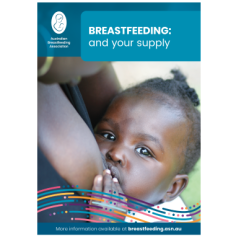Noticing less milk? Discover common causes and simple ways to help.

It’s common to notice ups and downs in your milk supply during breastfeeding. The good news is, small changes are often all that’s needed for you to make enough milk for your baby.
Why your milk supply might drop
Your breasts make more milk when your baby takes more milk. If your baby takes less, your supply may dip. Here are some common reasons your baby may not be taking enough milk to keep your supply up:
Not enough feeds: Most young babies need 8 to 14 feeds or more in 24 hours. Read more about feeding patterns in the early months.
Missed or delayed feeds: Feeding your baby whenever they show early signs of hunger helps keep your supply up. Delaying or stretching out feeds can mean your baby removes less milk, which may lower your supply.
Timing feeds: Limiting how long your baby feeds can mean they don’t get enough milk. Watch your baby, not the clock, to know when they’re done.
Baby not feeding well: If your baby is still learning to breastfeed, or is unwell, they might not remove enough. Support is available if you’re unsure.
Formula top-ups and solid foods: Regular use of formula or offering lots of solids will make your baby less hungry for breastmilk. This leads to fewer breastfeeds and a drop in supply. You can reduce top-up feeds and continue breastfeeding as your baby starts other foods.
Overuse of a dummy (pacifier): Using a dummy to settle your baby instead of offering the breast can lead to missed feeding cues and fewer breastfeeds. Over time, this can reduce the amount of milk your breasts make.
Other factors that may affect supply
It is common to notice small changes in your supply at times, even if breastfeeding has been going well. Sometimes these are related to your health or wellbeing.
Hormonal changes: Some women notice a brief drop in supply around the time of ovulation or a period. A few extra breastfeeds on those few days can help. A longer lasting decrease in supply can happen with pregnancy or the use of some types of contraception.
Illness and medicines: Being very unwell or taking certain medicines can lower supply. Talk to your doctor or pharmacist if you’re concerned.
Alcohol, nicotine, caffeine: Too much may affect milk production or your let-down reflex. These also pass through your milk to your baby making them fussy. Limiting these while breastfeeding can help.
Is it really low supply?
Some mums may think they have a low supply but it’s actually okay. Check your baby's wet and dirty nappies, growth and behaviour to see if they're getting enough milk.
How to increase your supply
Following your baby’s lead and feeding them as often and for as long as they need is the key to keeping your milk supply going well. If you do need to increase your supply there are simple steps to help.
© Australian Breastfeeding Association October 2025
Find out more about milk supply
Evidence-led info and practical tips from our Breastfeeding Information Series
Breastfeeding: and your supply




